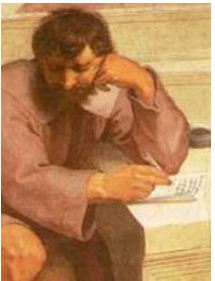Heraclides Ponticus
Born: c. 388 BC
Birthplace: Heraclea, Pontus, Greece (now Eregli, Turkey)
Died: c. 315 BC
Location of death: Heraclea, Pontus, Greece
Cause of death: unspecified
Gender: Male
Religion: Pagan
Race or Ethnicity: White
Occupation: Philosopher, Astronomer
Nationality: Ancient Greece
Executive summary: Perhaps an early heliocentrist
Heraclides Ponticus also known as Herakleides and Heraklides of Pontus, was a Greek philosopher and astronomer who lived and died at Heraclea Pontica, now Karadeniz Ereğli, Turkey. Heraclides' father was Euthyphron, a wealthy nobleman who sent him to study philosophy at the Platonic Academy in Athens under its founder Plato and under his successor Speusippus. Heraclides was nearly elected successor to Speusippus as head of the academy in 339/338 BC, but narrowly lost toXenocrates. It was a close battle between Xenocrates, Menedemus of Pyrrha and Heraclides Ponticus but Xenocrates triumphed by just a few votes.
The latter part of Heraclides’s life was spent at Heraclea. He is said to have been vain and fat, and to have been so fond of display that he was nicknamed Pompicus, or the Showy (unless the epithet refers to his literary style).
Various unused stories are related about him. For instance, on one occasion, Heraclea was afflicted with famine, and the Pythian priestess at Delphi, who was bribed by Heraclides, assured his curious townsmen that the famine would be stayed unless they granted a golden crown to that philosopher. This was done; but just as Heraclides was about to receive his honor in a crowded assembly, he was seized with apoplexy, while the dishonest priestess disappeared at the same moment from the bite of a serpent. On his deathbed he is said to have requested a friend to hide his body as soon as he die, and, by putting a serpent in its place, induce his townsmen to think that he had been carried up to heaven. However, the trick was discovered, and Heraclides received only ridicule instead of divine honors (Diogenes Laërtius V, 6). Heraclides seems to have been a versatile and prolific writer on philosophy, mathematics, music, grammar, physics, history and rhetoric.
One significant contribution of Heraclides is he proposed that the apparent daily motion of the stars was created by the rotation of the Earth on its axis once a day. This view contradicted the accepted Aristotelian model of the universe, which said that the earth was fixed and that the stars and planets in their respective spheres might also be fixed. It was believed that Heraclides kept a geocentric universe but suggested that Mercury and Venus orbited the Sun. (Heliocentric theories were rejected at the time of Heraclides because it was believed that the rotation of the Earth would cause falling bodies to be deflected westward.)
Heraclides also seems to have had an interest in the occult. In particular, he focused on explaining trances, visions and prophecies in terms of the retribution of the gods, and reincarnation.
A quote of Heraclides, of particular significance to historians, is his statement that fourth century Rome was a Greek city.
Apart from his writings on astronomy, Heraclides wrote on many of the usual topics that a leading philosopher of his day would have written on. These topics included ethics, literature, rhetoric, history, politics and music.
References:
http://www.nndb.com/people/675/000096387/
http://www.gap-system.org/~history/Biographies/Heraclides.html
http://scienceworld.wolfram.com/biography/Heraclides.html
